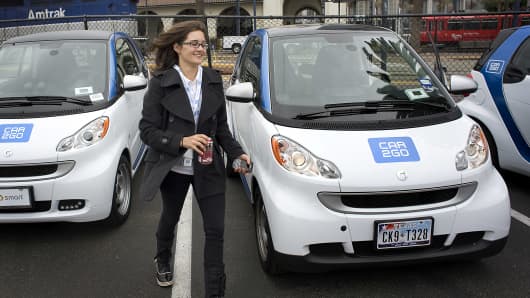The "driving boom is over," or so says a new study of American attitudes toward the automobile.
After decades of adding more cars to their household fleet while moving further and further out into the suburbs, Americans are waiting longer to get licensed, driving less and increasingly turning to alternatives such as mass transit or car-sharing programs, according to a new study by the U.S. Public Research Interest Group, or PIRG.
Declaring the boom in automotive transportation "over," the study stresses that, "the time has come for America to hit the reset button on transportation policy—replacing the policy infrastructure of the driving boom years with a more efficient, flexible and nimble system that is better able to meet the transportation needs of the 21st century."
The changes are apparent among virtually all demographic groups, but especially so with millennials. They're showing an increased desire to move back into urban centers where cars are often a hindrance, and they are increasingly turning to mass transit—a factor that can be seen in a steady growth in ridership on both city bus and rail systems and even the long-struggling Amtrak.
The trend, if it continues, would be one of the most significant shifts in American lifestyle in the better part of a century, according to the PIRG study, which comes just a year short of the 100th anniversary of the moving assembly line launched by Henry Ford to build his Model T.
The automobile, note researchers, helped completely redefine post-War America, and that led to a six-decade increase in the number of miles U.S. motorists logged each year. But federal data show that Americans have begun to reduce their driving this decade.
Exactly why is a matter of debate—as is the likelihood the trend will continue. Some studies suggest the decline is simply the result of the worst economic slump since the Great Depression, worsened by surging fuel prices. But PIRG's study indicates the shift is likely to be longer-term and reflects a very significant change in attitude among the nation's youngest generation of motorists.
It found that motorists aged 16 to 34 logged 23 percent fewer miles behind the wheel in 2009 than the same age group recorded in 2001. They're also waiting longer before actually obtaining their driver's licenses and using alternative transportation more often.
That is reflected not only in the increased use of mass transit but also in the growth of such alternatives as car-sharing services that can provide quick, short-term access to a vehicle without the hassles of ownership.
It's not just millennials. Overall, the percentages of Americans of driving age who actually were licensed fell to just 86 percent in 2011, a 30-year low. As recently as 1992, the figure stood at 90 percent. Meanwhile, the number of vehicles Americans owned has also begun to tumble.
For decades, there have been more cars than licensed drivers—reaching a record 1.24 vehicles per U.S. motorist in 2006. That is now down by 4 percent, according to PIRG.
"This is a new direction—a real break, a real change, said Phineas Baxandall, a PIRG analyst and the study's co-author. "After 2004, on a per capita basis, driving has gone down, and the number of vehicle-miles driven has also gone down each year since 2004."
The data give hope to those who'd like to see a shift in public spending away from roads and other automotive infrastructure in favor of mass transit. But not everyone is willing to accept that the trends identified by the PIRG study are permanent.
"Younger buyers under 30 are listing financial problems as their reason for not buying new cars," Sean McAlinden, chief economist for the Ann Arbor, Mich.-based Center for Automotive Research, told Reuters. "If and when the economy recovers, [they] will buy cars at the same rate as other generations."
Other analysts, however, note that increases in urban population are likely to remain an active trend with U.S. millennials, echoing a global push toward urbanization. And that will almost certainly require changes in policy, both on the private and public level.
It's a factor a number of automakers have identified and are responding to in various ways, including more active participation by manufacturers like Ford and Daimler AG in car-sharing services that can serve as a substitute for individual vehicle ownership.
On the other hand, says marketing executive Amy Marentec, as millennials age, move back out to the suburbs and follow more traditional trends, Ford hopes that they'll "be more familiar with our products and willing to buy them."
_ By Paul A. Eisenstein, NBC News


